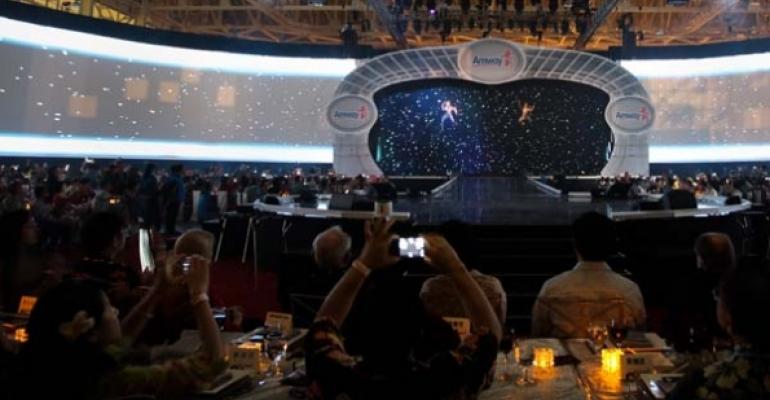Social media extends the reach of events, boosts engagement and often doesn't cost the event host a dime. So social media is great for events—except when it's not.
Although very few special event professionals have felt the need to curtail social media at their events—and some question whether it can ever be blocked completely—others say that in certain situations, prohibiting posts is vital. And they use a variety of strategies to do it.
PROTECTING PROTOTYPES
For example, international event powerhouse Vok Dams Group handles huge events for huge automotive companies. And for events presenting show cars that are not yet available in the market, "We have to make sure that no pictures are taken and posted," notes owner Colja Dams.
To safeguard the prototype cars, the Vok Dams team uses "airport-style security" techniques, Dams says. "Guests are not allowed to enter with mobile phones or cameras." The company's events are so big that it sometimes has to screen more than 5,000 guests, Dams notes.
For Heather Pilcher, CSEP, national director of sales for Orlando, Fla.-based Blue Spark Event Design, protecting one client's future plans was paramount.
"With this specific event, the client was going through major changes that would affect the entire company and its personnel," Pilcher explains. "However, the changes had not yet been rolled out to the company or the public, so the information shared in the conference had to be controlled."
To make sure the plans stayed confidential, Pilcher and team changed how they delivered information to guests. "We altered our team-building technology, which was developed on an iPad to prevent access to the Internet or any social media outlets," she explains. "The client was very specific in wanting to make sure all photos, videos, etc., were controlled and delivered back to them for their usage only."
PRIVACY, PLEASE!
And even in this age of over-sharing, there are still people who want to keep their private lives, well, private.
Jacque Riehl, owner and creative director of Salt Lake City-based Riehl Events, has produced events for private social clients who "were high-profile and did not want to have their personal lives splashed all over social media and the Internet."
To stop social media sharing, Riehl and her team have used a range of techniques. In one case, "The event website was passworded, and all vendors were required to sign confidentiality agreements, as well as guests were politely requested to not post images or any text about the event/s," she explains.
"We even had one client that required all of the guests to sign a confidentiality contracts before attending, and we were required to make sure that all in attendance had theirs signed and returned to us as well as use an Internet and cell black-out system," Riehl notes. "The event was very hush-hush!"
CAN YOU STOP IT ALL?
Is it even possible to block all social media sharing at events? Event pros say it's tough.
In some cases, Riehl says, she has been "100 percent successful" in blocking social media sharing. "But that can be very difficult unless you do a WiFi and cell coverage black-out for the entire venue and surrounding areas," she notes. "Otherwise, we have been fairly successful. We find that guests attending these types of events are usually understanding, and so there are usually not too many issues. With these types of events, we find we have to deal more with the paparazzi than the guests."
Indeed, the sophistication and rank of event guests has a big impact on how likely they are to resist the urge to post every moment they experience.
In Pilcher's case, the high level of the event attendees meant they understood the importance of confidentiality.
"With this client, the attendees were all C-level executives who were aware of the situation and changes coming to the company," she explains. "Therefore, out of pure respect for their organization and their positions, I doubt they went against the suggested social media guidelines."
Valerie Percival, special events manager for IBM Australia, says she rarely faces the problem of over-eager social sharing.
"Given that the types of events I'm managing now are high-end client dinners with opera or orchestral performances and our audience is CEO level, generally speaking, the more mature attendee," she explains. "If they have their mobile phones with them, they turn them off."
"Social media has become part of the fabric of the lives of young consumers--18-35--and should be embraced so that as an agency we can pre-plan the impact of social media on an event effort to ensure the net impact is positive," says Avik Prabhu, executive director of New Delhi-based Showtime Group. "By definition, the power of the impact from social media lies in the hands of our guests and hence cannot be tightly controlled--some posts will be positive and some negative—however, a planned effort should be able to create a net positive impact."





